- Home
- Jason McIntyre
Deathbed (Dovetail Cove, 1971) (Dovetail Cove Series) Page 4
Deathbed (Dovetail Cove, 1971) (Dovetail Cove Series) Read online
Page 4
“All right, then,” I said, turning to go. “I’ve got some things to do. I’ll let you to it. You have your walkie-talkie there. I’m on channel eleven if you need anything. Don’t wander off, m’kay?”
“Won’t,” Ketwood said, straining to get a set of screws loosened while his boy aimed a torch for him. He didn’t look back at me.
As I headed down to the elevator, I heard Sean Ketwood ask his father one more question.
“Dad? How’re we gonna get all this done? It’s such a stew.”
And his dad said, I kid you not, “Sometimes a man’s gotta make chocolate pudding out of last night’s shit.”
5.
I took the main elevator down to ten. That’s where Drumheller’s office was. Nine times out of ten he was doing work on the levels below—stuff that I wasn’t, as they say, privy to. He was here today. His desk and credenza wore their usual piles of papers, folders and books. He was at his desk staring into the tube of what looked like a medium sized black and white set. I couldn’t see the screen.
He looked up at me when I cleared my throat at the door.
“Doctor,” I said to his one visible eye. The rest of him was in a hunch and hidden behind his piles and that weird mystery box of his.
“Munn,” he said. I could hear disdain in his voice. I didn’t have a hoity-toity title. He’d made me feel like shit for it before, and he never called me Facilities Manager Munn. He and I had gotten into words a time or two and, on one occasion, he’d even said aloud how he couldn’t believe a rat like me—with only a grade eight education—was granted the clearance (and the salary) I had.
Dr. Drumheller had no respect for me. That was clear.
And he knew I had little for him as well. Even less on this day.
“Can I help you with something, Munn?” he asked. “I have work.”
I stepped in, clutching my own file folder. “Only be a tick,” I said. “One quick thing and then I’ll let you alone.”
He stood, straightening his white lab coat and pushing his spectacles up his nose. He was a rather distinguished man. The world, I’d learned, makes way for good talkers. Drumheller, despite his beakers and his test tubes (or whatever kind of science he did), was a good talker. He spun enough stories to get enough money and that propelled him up the ladder.
Scratch what I wrote a moment ago. It’s not that I had little respect for him. I actually had a lot—for what he’d accomplished in roughly the same number of years on God’s green earth as me. I just didn’t like him. He thought himself better than the rest of us. And that made me want to punch him hard enough to knock his shiny white teeth out of his mouth and his shiny, clean spectacles off his face.
I tossed the file folder down on the pile of haphazard papers and materials on the doctor’s desk. “Here,” I said. “You may wish to peruse this as we talk.”
I liked using big words when I was talking to someone like Drumheller. It brought me to their level.
“Have you got the electrician working on Seven this morning?” he asked, a bit exasperated. I only nodded. He reached for the folder. I was impressed that it hadn’t slid off. “What is this?” he asked. “More expenses for the electrical upgrades?”
He opened it. It wasn’t expenses. The contents of the folder had nothing to do with Drumheller’s work. Or the plant’s. It had nothing to do with anything that he and I had ever exchanged.
“Remember when you called me out in front of my staff?” I asked, circling around to the side of the desk so I could catch a simultaneous glimpse of the insides of the folder while still seeing Drumheller’s reaction. “You asked me how much education I really had. You were right. I’m no smarty pants. Grade eight was all I could get until my Dad needed me to run the farm. He’d gotten sick. So me, his oldest boy, I had to step up to the plate. But, you know what, Doctor? It got me thinking. It got me wondering about a smarty-pants who asks questions about other people’s schooling.”
I saw Drumheller’s cheeks and forehead going pale as he thumbed through the few pieces in the folder. He still hadn’t looked back at me.
“I wondered about who was asking the question. So I decided to ask some questions of my own. I have friends at that university you said you attended. Or, rather, I have friends who can look into that sort of stuff. For a price. And that price isn’t nearly as high as you think it is.”
The nuts and bolts of it are this. As Drumheller looked through the folder I’d given him, I laid out what he and I both knew. “You got this posting predicated on a number of well-managed lies, Doctor. Oh, you got your education, but not from the Ivy League where your certificate says you did. I talked on the phone with the guy who made that piece of paper. I also talked to the records clerk who made some of the other papers go away. Trouble is, they didn’t all disappear. Not everyone’s as dishonest as you. And there’s always a file drawer somewhere.”
Still, the good doctor didn’t respond. He stared down at the open folder, looking at a copy of a birth certificate—his. “That’s yours. Not sure if you remember it. But after you had your trouble with the law, you had that feller make you a new one. Problem is, the new one had a different name.
“Doctor, I’m sure you realize what an offence it is to lie to your government about your previous incarceration when they do a record check for your security clearance.
“And I’m sure you fully understand how valuable information like this is...and what someone like yourself would pay to keep it...safe.”
Part III
Somewhere Beyond the Sea
1971
1.
Farrah stopped reading. Her eyes were wide, staring down at the pages. She thought she might look just the same as that Doctor Drumheller had looked when he’d seen the copy of his incarceration record, his original birth certificate and the other papers that Farrah had in her black tin box. She realized she was clutching the black journal like its cover might turn to wings and bring it to flight. Her fingers had left small, sweaty dimples on the pages.
She looked over at Gran. The old woman’s eyes were both closed now. Her head was back on the mound of pillows propped behind her sallow and spindly form. She looked incredibly small. The cold of the room was deep and impenetrable.
From behind her, a voice: “Farrah?”
Farrah turned. It was Nurse Anne. “Let’s let her sleep, okay?”
Farrah hopped off the bed and started gathering the papers and boxes back into the black tin. “Okay,” she said like a girl half her age who’d just been told to tidy up her colouring before dinner.
She had hoped that the story would keep Gran interested, would keep her listening, maybe even perk her up some. She had hoped it might prompt Gran to tell one of her own stories.
Now, sullen—and not just for what she was learning about that awful man, Munn, in the journal—but most especially for Gran’s continued failure of her health—Farrah followed Nurse Anne out into the hallway.
The nurse got Farrah settled at Gran’s kitchen table with a stack of cookies, a glass of milk and some crayons. Farrah didn’t bother telling Nurse Anne that she was far beyond the age when cookies and crayons could heal everything a Bandaid couldn’t. Much too old, now; Farrah had seen things.
Instead, she just looked through the contents of her mystery box, thinking about how she’d gotten it from the old grey-haired junk dealer, about how that man in the story had tried to get the better of the other man in the story.
She was thinking about all this and then decided that, as much as she wanted to keep reading, she’d wait. She’d wait for Gran to wake up and read it to her. They’d experience this tale together.
Nurse Anne was in with her now, taking temperature and blood pressure while Gran dozed. Then she came back to the kitchen and made a phone call.
“You calling my dad?” Farrah asked, sheepish, as Nurse Anne reached the receiver from its cradle.
“Uh-huh,” Anne said looking up the number on a sheet magnetized to Gran�
�s old fridge.
“Don’t tell him I’m here, okay?” Farrah said.
Anne gave a little smile. “I won’t,” she said as she started dialing. “But you need to skedaddle pretty soon. I don’t know if your gran is going to be in the mood for visiting more tonight. She might sleep on through til morning.”
“Kay,” Farrah said and hung her head, fingering the corners of Drumheller’s phony university degree.
Farrah fiddled with the sheets of old, yellowed paper. Another piece of the Munn and Drumheller puzzle revealed itself. One of the pages was stuck to a second. The one underneath was a badly faded newspaper clipping from the Island Press. Farrah was pretty sure Dovetail Cove didn’t have its own newspaper anymore. A gent by the name of Barstow used to run it but now he did a coupon circular for the grocery stores (one that Rod Davies, the postman would hand out on his route). Barstow also coordinated ads in the mainland papers for all the B&Bs and the ferry to keep tourists flowing to the island during the summer months. He was old and round, that Barstow feller, liked to look at the ladies. And he smoked cigars. The only reason Farrah remembered him is that he’d started to look at Farrah the way he looked at other women when they were down on Main—the way he used to look at Farrah’s mom. She could picture him out front of his office, leaning on a potted plant and chewing the nub of a little browny-grey thing and stinking of that smoke as he leered in the direction of tourists or townies. Farrah hated that smell.
Farrah realized she’d gone to dreamland. She was very far away, just as far as the story in the black book really was, despite how close it felt when she read Munn’s words.
She looked down at the faded newspaper clipping. It was torn out, not cut. And it was dated the 11th of August, 1956. Weekend Edition, it touted. The headline was a light grey now and it said, Plant Incident Prompts Inquiry.
Nurse Anne had left the kitchen. Behind her, the spiralled telephone cord bobbed against the fridge and the corner of the wall. Farrah came back to the present. She had made a conscious effort to be quiet. If Anne didn’t betray her and tell her dad that she was here, then she wouldn’t pipe up and give herself away. No sense getting into trouble for being out if she didn’t have to. She’d go in a few minutes anyway. If Gran was resting, she might as well get home before Dad.
Into the receiver, Nurse Anne was saying, “…Multiple strokes…” and then she was saying something about, “…weak heart…” and “…difficulty catching breath…” Those ominous phrases were a lot like Can’t hurt. These ones were similar and, obviously more specific. They all meant the same thing: we can’t make anything any better, so why bother trying?
Nurse Anne said goodbye to Farrah’s father and came back around the corner to hang up the phone.
“Can I see Gran?” Farrah asked. She didn’t ask if Dad was coming to see Gran. She knew the answer to that question.
Nurse Anne was distracted. “Hmm? Oh. Farrah, just give me a minute, okay? I’m going to give Gran a little something to help her with any pain she’s having. I’ll call you in when I’m done. M’kay?”
Farrah said nothing, only watched the nurse go to the counter and paw through the enormous stash of medical supplies. She took a vial and a syringe with her and disappeared back down the hall.
With the sight of that syringe, Farrah decided she was staying. She didn’t care if she got in trouble with Dad. She was staying and she was going to see Gran again tonight, even if Gran only woke up for a few minutes before whatever was in that syringe did its work.
Against Nurse Anne’s instructions, Farrah followed her down the dark hall and stood at the cracked door, again clutching the black journal as though it might escape. A sliver of light from Gran’s lamp spilled out on her. She brought one eye to bear on the tiny bar of movement inside. Nurse Anne moved in front of the doorway, her back to Farrah. Then she leaned down with her back to the door. She saw Gran’s bare old liver-spotted arm with hanging skin. There was a rubber tube tied at its bend. The long steel prick of the needle went in like a dull knife cutting into a stick of butter fetched from the deep freezer. Nurse Anne struggled to poke through into a vein. If she’d looked up, she might have seen Farrah in the tiny mouth of the doorway, reflected in the nighttime world of Gran’s big window. But the nurse was concentrating. She said something quietly to Gran and Farrah heard Gran give out a low moan of response.
This was not good, Farrah decided. This was not good at all. This was Can’t hurt but in a big way. Nurse Anne wasn’t hurting Gran, Farrah knew that. There was no one more gentle to care for Gran than this nurse. But just the same, this was a kind of ‘going through the motions’ that accomplished nothing for Farrah’s Gran. She was about to push the door open when she heard Gran’s voice. Not strident, but not a whisper either.
“Farrah, dear. I know you’re there. Come in and tell me the rest…before Gran goes to sleep.”
Part IV
The King and the Lion
1956
1.
This day was getting better.
When Doctor Drumheller finally looked up from the file folder and met my eyes, he had big gobs of wet in his. I was feeling so satisfied that I nearly let out a gale of laughter. But I held it in. I needed to keep calm. I needed to keep ownership of this situation.
“Who else knows about this?” he asked me quietly.
“Just me,” I said. I was trying to keep the haughtiness out of my voice, but I couldn’t help but let some seep in. “Me and my guy on the mainland who gathered up these documents. Wasn’t expensive. Wasn’t cheap neither. But I’m sure you’re going to compensate me nicely. Otherwise, you’ll be looking for a new position. I’m sure there aren’t a lot of research projects like this one out there. And most are government, I’d presume. You piss that employer off, you’ll be in a bread line before you’ll be asked back to the party for a dance.”
Drumheller swallowed. Those gobs of water in his eyes clung there. He didn’t let them fall yet.
Finally, he said. “How much?”
Smug, I said, “How much what?”
Giving me a little eye roll that said, Just how dumb are you?, the doctor asked. “How much to keep this inside my office. To keep noses out of it? It’s not what you think.”
“Oh, I’m sure it’s not. But it doesn’t matter what I think. It’s what I can prove. And that folder there has a lot of proof in it.”
Drumheller cleared his throat. He spoke a bit louder now, but those tears still didn’t fall. His eyes were turning pink in behind them. “…and I presume these are not the only copies?”
“You presume correct,” I said. There was a company out of Oregon that used some damned thing called an electrofax—it cost me a bundle but it made copies much closer to an original than a mimeograph. It was expensive but I looked at it as an investment. I gently closed the folder of electrofax copies in his hands and then took the shut folder from him. He only stood like a statue. “I want you to stew on it some,” I said. I turned to go, leaving him there in pristine silence. “We’ll discuss our price in a day or so,” I said.
Drumheller said nothing. I could feel his stillness, even with my back to him. This is what real strength feels like. The great and powerful Oz had come out from behind his curtain. And I couldn’t be more tickled. Not only was I witness to the beginning of his fall, but I was also the cause.
As I left, I didn’t look back, but I’d bet my eye teeth he let those tears go.
2.
I stopped for coffee with Jimmy, the gate guard. He was a lot younger than me, but he listened to my bullshit and was right to; I could have him fired if he didn’t give me my due.
The blue morning had vamoosed. Clouded now, it looked like rain and there was an awful, salt-smelling wind coming off the ocean. It bugged me when it came this far inland. I hated the smell. The plant was as close to the middle of the island as you could get—at least east to west. There was a big north part of the island I’d never seen. Story was, this whole island had
been claimed by a Sardinian king three or four hundred years back. King Victor Amadeus I, Duke of Savoy and King of Cyprus.
He did kingly things, this feller. He liked to hunt big game so he had animals brought over on these big ships—least that’s what the men down at the watering holes on Beacon told me. He built a nature preserve up northeast way and got teams to till the earth to the northwest.
His idea had been to build a village for his staff, roughly where the town of Dovetail Cove had eventually sprouted up. That was at the lower end of the mouth of the biggest cove. Northeast of that—right about where the plant now stood, that was going to be his gated palace. A big thing that fed from the creek before it branched off and headed north. And this was only going to be his seasonal place, mind you. He was still on whatever throne he held and he was still in his prime. More battles to fight, I guess.
He had a good mind, that king, whoever he was. I liked his style.
He had it all figured out, King Victor Amadeus, had his ducks in a row you might say. So it goes, the king brought everything they might need. Seeds and livestock, building tools and families. But his vision was a little too complete. He brought everything needed for a full-functioning society, hint-hint, wink-wink, if you catch my drift. And if he hadn’t brought a cadre of harlots with him, he might have built his empire to the sky. At least one of those single women brought a case of syphilis, the Beacon crew told me, but I don’t know how much of the story was fogged by either the passage of time or too many Scotch and ice.
Victor’s men succumbed to those poison ladies, as they were called, and his workforce was decimated. And, of course, he fell too. Despite his lady in waiting, ol' Victor couldn’t let his work-a-day men have all those pretty women to himself, so he died around fifty years of age, I believe.

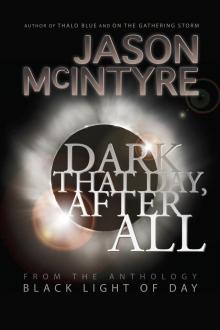 Dark That Day, After All
Dark That Day, After All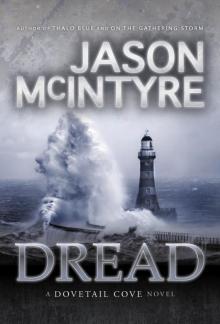 Dread
Dread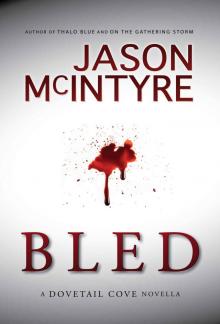 Bled
Bled Instead
Instead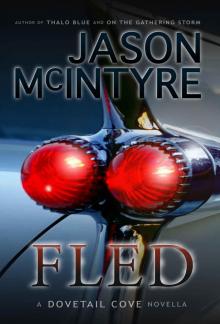 Fled
Fled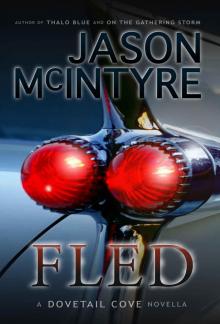 Fled (Dovetail Cove, 1973) (Dovetail Cove Series)
Fled (Dovetail Cove, 1973) (Dovetail Cove Series)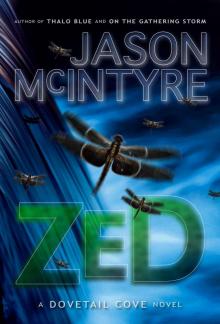 Zed
Zed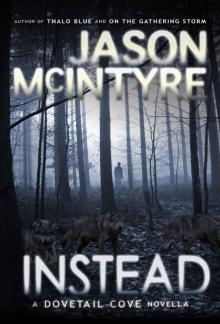 Instead (Dovetail Cove, 1979) (Dovetail Cove Series)
Instead (Dovetail Cove, 1979) (Dovetail Cove Series)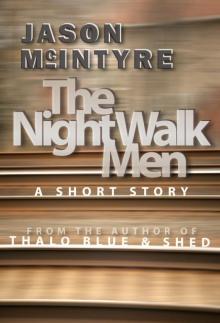 The Night Walk Men
The Night Walk Men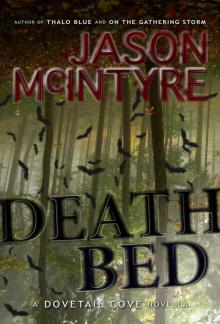 Deathbed (Dovetail Cove, 1971) (Dovetail Cove Series)
Deathbed (Dovetail Cove, 1971) (Dovetail Cove Series)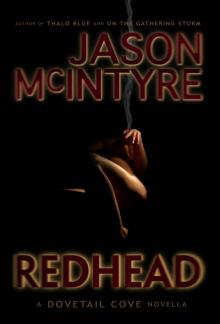 Redhead (Dovetail Cove, 1974) (Dovetail Cove Series)
Redhead (Dovetail Cove, 1974) (Dovetail Cove Series)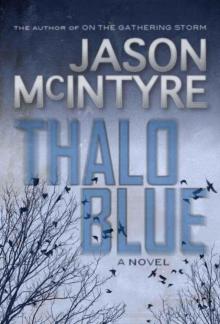 Thalo Blue
Thalo Blue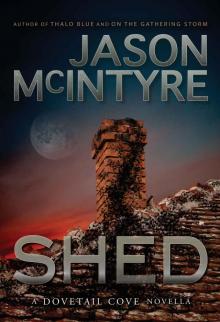 Shed
Shed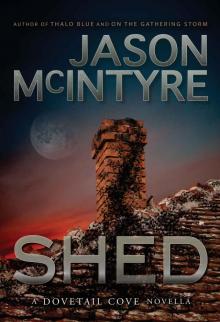 Shed (Dovetail Cove, 1977) (Dovetail Cove Series)
Shed (Dovetail Cove, 1977) (Dovetail Cove Series)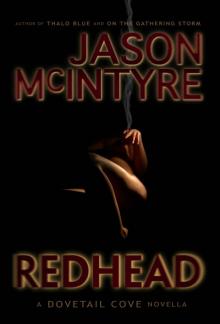 Redhead
Redhead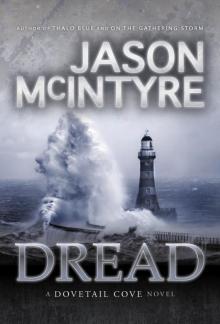 Dread (Dovetail Cove, 1978) (Dovetail Cove Series)
Dread (Dovetail Cove, 1978) (Dovetail Cove Series)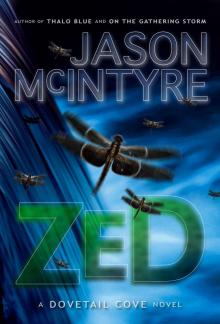 Zed (Dovetail Cove, 1975) (Dovetail Cove Series)
Zed (Dovetail Cove, 1975) (Dovetail Cove Series)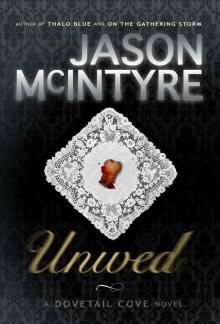 Unwed (Dovetail Cove, 1976) (Dovetail Cove Series)
Unwed (Dovetail Cove, 1976) (Dovetail Cove Series)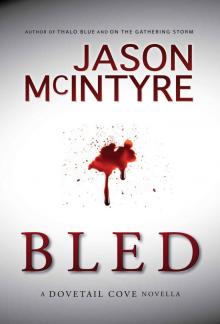 Bled (Dovetail Cove, 1972) (Dovetail Cove Series)
Bled (Dovetail Cove, 1972) (Dovetail Cove Series)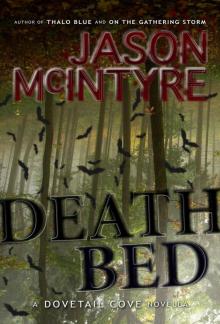 Deathbed
Deathbed